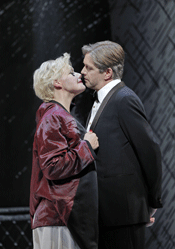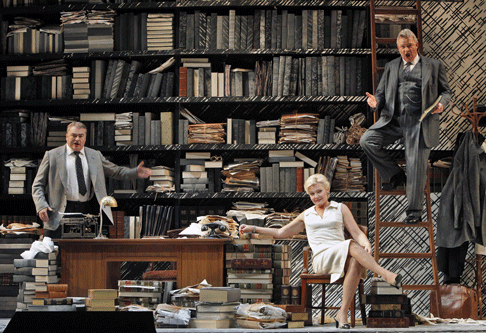![Karita Mattila as Emilia Marty [Photo by Cory Weaver courtesy of San Francisco Opera]](http://www.operatoday.com/Mattila2.gif)
20 Nov 2010
The Makropulos Case in San Francisco
Just now in San Francisco Finnish soprano Karita Mattila kicked ass as Janáček’s 337 year old Elina Makropulos.*
English Touring Opera are delighted to announce a season of lyric monodramas to tour nationally from October to December. The season features music for solo singer and piano by Argento, Britten, Tippett and Shostakovich with a bold and inventive approach to making opera during social distancing.
This tenth of ten Live from London concerts was in fact a recorded live performance from California. It was no less enjoyable for that, and it was also uplifting to learn that this wasn’t in fact the ‘last’ LfL event that we will be able to enjoy, courtesy of VOCES8 and their fellow vocal ensembles (more below …).
Ever since Wigmore Hall announced their superb series of autumn concerts, all streamed live and available free of charge, I’d been looking forward to this song recital by Ian Bostridge and Imogen Cooper.
The Sixteen continues its exploration of Henry Purcell’s Welcome Songs for Charles II. As with Robert King’s pioneering Purcell series begun over thirty years ago for Hyperion, Harry Christophers is recording two Welcome Songs per disc.
Although Stile Antico’s programme article for their Live from London recital introduced their selection from the many treasures of the English Renaissance in the context of the theological debates and upheavals of the Tudor and Elizabethan years, their performance was more evocative of private chamber music than of public liturgy.
In February this year, Albanian soprano Ermonela Jaho made a highly lauded debut recital at Wigmore Hall - a concert which both celebrated Opera Rara’s 50th anniversary and honoured the career of the Italian soprano Rosina Storchio (1872-1945), the star of verismo who created the title roles in Leoncavallo’s La bohème and Zazà, Mascagni’s Lodoletta and Puccini’s Madama Butterfly.
Evidently, face masks don’t stifle appreciative “Bravo!”s. And, reducing audience numbers doesn’t lower the volume of such acclamations. For, the audience at Wigmore Hall gave soprano Elizabeth Llewellyn and pianist Simon Lepper a greatly deserved warm reception and hearty response following this lunchtime recital of late-Romantic song.
Collapsology. Or, perhaps we should use the French word ‘Collapsologie’ because this is a transdisciplinary idea pretty much advocated by a series of French theorists - and apparently, mostly French theorists. It in essence focuses on the imminent collapse of modern society and all its layers - a series of escalating crises on a global scale: environmental, economic, geopolitical, governmental; the list is extensive.
For this week’s Live from London vocal recital we moved from the home of VOCES8, St Anne and St Agnes in the City of London, to Kings Place, where The Sixteen - who have been associate artists at the venue for some time - presented a programme of music and words bound together by the theme of ‘reflection’.
'Such is your divine Disposation that both you excellently understand, and royally entertaine the Exercise of Musicke.’
Amongst an avalanche of new Mahler recordings appearing at the moment (Das Lied von der Erde seems to be the most favoured, with three) this 1991 Mahler Second from the 2nd Kassel MahlerFest is one of the more interesting releases.
‘And there was war in heaven: Michael and his angels fought against the dragon; and the dragon fought and his angels, And prevailed not; neither was their place found any more in heaven … that old serpent … Satan, which deceiveth the whole world: he was cast out into the earth, and his angels were cast out with him.’
If there is one myth, it seems believed by some people today, that probably needs shattering it is that post-war recordings or performances of Wagner operas were always of exceptional quality. This 1949 Hamburg Tristan und Isolde is one of those recordings - though quite who is to blame for its many problems takes quite some unearthing.
There was never any doubt that the fifth of the twelve Met Stars Live in Concert broadcasts was going to be a palpably intense and vivid event, as well as a musically stunning and theatrically enervating experience.
‘Love’ was the theme for this Live from London performance by Apollo5. Given the complexity and diversity of that human emotion, and Apollo5’s reputation for versatility and diverse repertoire, ranging from Renaissance choral music to jazz, from contemporary classical works to popular song, it was no surprise that their programme spanned 500 years and several musical styles.
The Academy of St Martin in the Fields have titled their autumn series of eight concerts - which are taking place at 5pm and 7.30pm on two Saturdays each month at their home venue in Trafalgar Square, and being filmed for streaming the following Thursday - ‘re:connect’.
The London Symphony Orchestra opened their Autumn 2020 season with a homage to Oliver Knussen, who died at the age of 66 in July 2018. The programme traced a national musical lineage through the twentieth century, from Britten to Knussen, on to Mark-Anthony Turnage, and entwining the LSO and Rattle too.
With the Live from London digital vocal festival entering the second half of the series, the festival’s host, VOCES8, returned to their home at St Annes and St Agnes in the City of London to present a sequence of ‘Choral Dances’ - vocal music inspired by dance, embracing diverse genres from the Renaissance madrigal to swing jazz.
Just a few unison string wriggles from the opening of Mozart’s overture to Le nozze di Figaro are enough to make any opera-lover perch on the edge of their seat, in excited anticipation of the drama in music to come, so there could be no other curtain-raiser for this Gala Concert at the Royal Opera House, the latest instalment from ‘their House’ to ‘our houses’.
"Before the ending of the day, creator of all things, we pray that, with your accustomed mercy, you may watch over us."
![Karita Mattila as Emilia Marty [Photo by Cory Weaver courtesy of San Francisco Opera]](http://www.operatoday.com/Mattila2.gif)
Just now in San Francisco Finnish soprano Karita Mattila kicked ass as Janáček’s 337 year old Elina Makropulos.*
Specifically she kicked the asses of the several men who materialized in her long, long life just as the effects of the longevity potion her father invented back in 1593 began to wear off. These unfortunate men had awakened those few moments when, over the centuries, her soul had been moved, and these rediscovered feelings conflicted with her instinct for eternal life as she had come to understand over the centuries the futility of her emotions. She finds resolution of this conflict in death.
This bizarre masterpiece is, all said and done, Janáček’s idea of a comedy. His uniquely middle European depressive poetic, melding philosophy with highly complex emotions took solid hold into the reaches of War Memorial Opera House by its third performance (November 17).
Universally vivid performances. Elina’s great, great, great, etc., grandson Berti sung by Slovakian tenor Miro Dvorsky touched the true tonalities of the Czech language, the Prus of German bass-baritone Gerd Grochowski found the suavity and confidence of an Austro-Hungarian aristocracy, the fumbling lawyer Dr. Kolenaty was enacted skillfully by stalwart San Franciscan buffo Dale Travis.
 Karita Mattila as Emilia Marty and Gerd Grochowski as Jaroslav Prus
Karita Mattila as Emilia Marty and Gerd Grochowski as Jaroslav Prus
Touching were the performances of Adler alumni Thomas Gleen as Vitek and Brian Jagde as Janek, the callow young victim of Elina’s perfected sexual prowess. Adler alumnus Matthew O’Neill was caricatural pure perfection as Elina’s idiot lover Hauk, as was Kristina, the opera-star-to-be (Elina Makropulos’ protege) sung by Susannah Biller.
Dominating the stage equally were Janacek’s heroine Karita Mattila as Elina Makropulos and Janáček’s orchestra conducted by Jiří Bělohlávek. They were simply one and the same, one soprano embodying Mo. Bělohlávek’s seventy-three players. Yes, the performance was huge. She was huge, the enormity of 337 years of life graphically unravelling on the stage was quite real.
The story of Elina Makropulos is told musically rather than dramatically, the little lawsuit Gregor vs. Prus merely pretext for the inner life of Mme. Makropulos to explode in the orchestra, superseding the dramatic inconsistencies and general confusion of the libretto.
Mme. Mattila absorbed every musical movement in a dramatic performance so complete that it will become legendary as it traverses the world. For this she has partnered with conductor Bělohlávek who revealed the gamut of the depraved humanity Janáček had transformed into pure music in his preceding oeuvre. Like all Janáček heroines Elina Makropulos too attains a sort of salvation by reconciling herself to the futility of life and therefore accepting death.
 Miro Dvorsky as Albert Gregor, Karita Mattila as Emilia Marty and Dale Travis as Dr. Kolenatý
Miro Dvorsky as Albert Gregor, Karita Mattila as Emilia Marty and Dale Travis as Dr. Kolenatý
The production by Viennese director Olivier Tambosi merely supported the Mattila performance, the stylishly directed supporting cast moving appropriately over the turntable set imagined by big-time designer Frank Philipp Schlössmann. Like the staging the set disappeared behind the Mattila performance. Its cartoon lines were self-consciously descriptive of a caricatural concept that the production flirted with but never fully absorbed. Maintaining this careful balance of caricature and expressionist comedy was however the strength of the production, allowing at least some perspective for the over-the-top Mattila performance.
*“Let’s kick ass” was Mme. Mattila’s term before attacking Salome last year on the Met’s Live in HD.
Michael Milenski